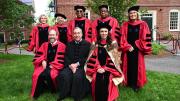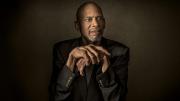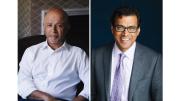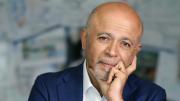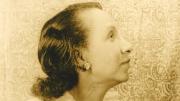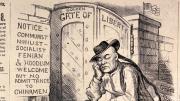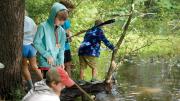During the 371st Commencement this morning, Harvard will celebrate a small cohort of accomplished leaders, conferring honorary degrees in person on four women and two men: a prime minister, three distinguished scholars, a public-sector infectious-diseases expert, and a feminist icon. In addition, setting aside its usual requirement that honorands be present to receive their degrees, the University will also recognize a world food humanitarian who cannot attend the ceremonies for the understandable, awful reason that he is fully engaged in providing relief in war-torn Ukraine.
The recognition, along with the resumption of in-person ceremonies, reflects a reversion to proper form. During the early pandemic crisis, in the spring of 2020, the truncated online graduation proceeded without honorands (but with a guest speaker). Last year, with time to mount a more elaborate set of online Commencement-week “events,” honorands were recognized and received their degrees virtually, along with everyone else. This was a necessary break with Harvard precedent: in a year when the campus operated remotely, the University accommodated itself to reality and proceeded online. Many of the 2021 honorands are expected to appear, along with graduates from the classes of 2020 and 2021, at the make-up celebration and degree-confirmation ceremony in Tercentenary Theatre this Sunday, May 29.
Today’s honorands are listed below in alphabetical order (not necessarily in the order of conferral of degrees). For details on the conferrals, check back for coverage of the Commencement ceremonies later today at www.harvardmagazine.com.
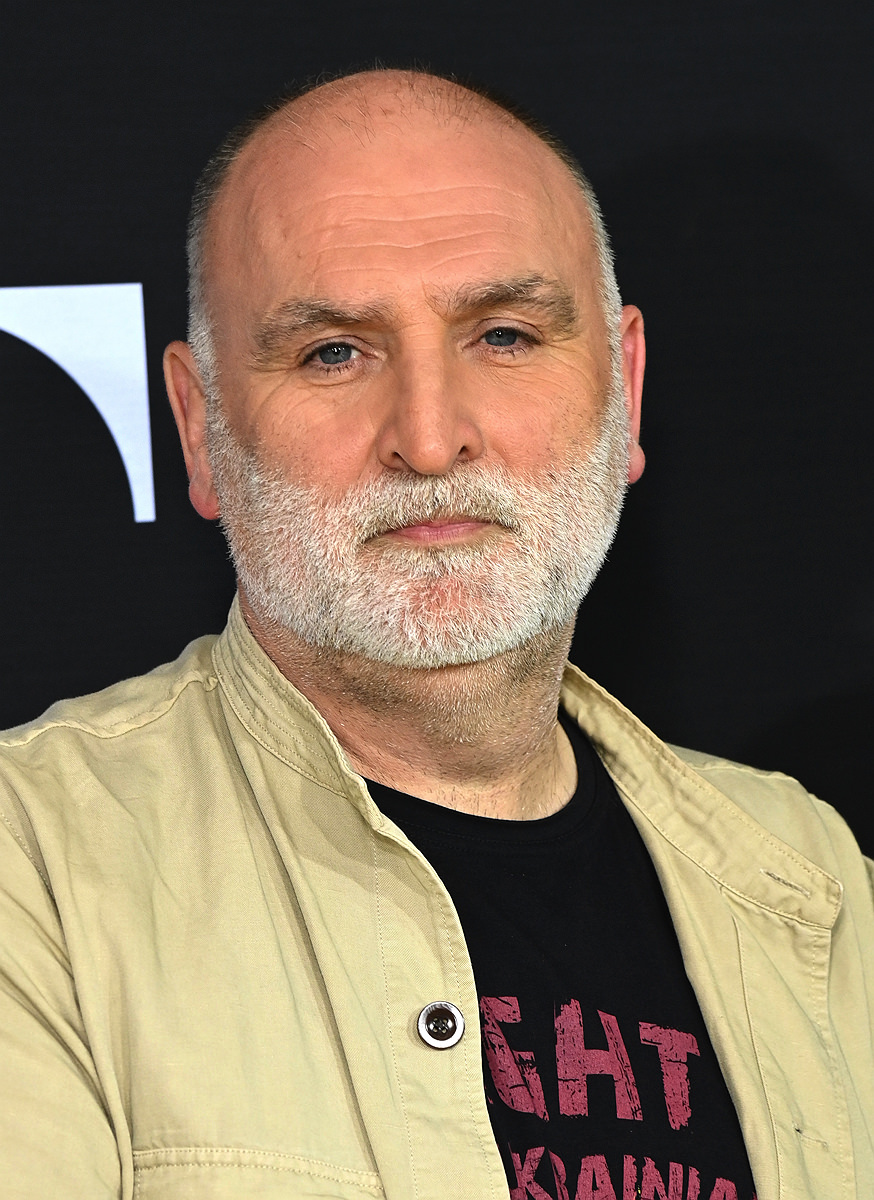
José Andrés
Photograph by Bryan Bedder/
Getty Images for National Geographic)
José Andrés, chef, restaurant owner, and food entrepreneur, is the founder of World Central Kitchen, which provides meals to those in need in the wake of natural disasters and is now—amid the Russian invasion of Ukraine—fully engaged in the relief effort in that desperate nation. The University hopes to confer his degree in person when circumstances permit in the future. According to his WCK biography, “Chef José Andrés, born and trained in Spain, moved to the U.S. at age 21. He soon settled in Washington, D.C., and began volunteering at DC Central Kitchen, where he started to think big about philanthropy. Over the course of his career as a chef and restaurateur, he saw the role of cooks—and the power of food—to change the world. This path inspired José to found World Central Kitchen in 2010 after a devastating earthquake in Haiti, with the support of his wife Patricia, as well as his business partner Rob Wilder and his wife Robin. Since then, he’s pursued a mission to fulfill the words of John Steinbeck: ‘Wherever there’s a fight so that hungry people may eat…we’ll be there.’” This recent New Yorker article describes a forthcoming documentary about Andrés and his work. He is expected to be awarded an honorary Doctor of Humane Letters (L.H.D.) degree.
The Right Honourable Jacinda Ardern, who will be the guest speaker this morning, has been prime minister of New Zealand since 2017. In the University’s announcement, President Lawrence S. Bacow said of the guest, “Prime Minister Ardern is one of the most respected leaders on the world stage and we are delighted she will join us…to celebrate the class of 2022. From climate change and gender equality to COVID-19, she has modeled compassionate leadership that has brought together empathy and science-based solutions to address the most challenging issues of our time.”
Born in Hamilton, New Zealand, in 1980 as the child of a police officer and a school cafeteria worker, Ardern graduated from the University of Waikato in 2001. She began a career in politics working in the office of former New Zealand Prime Minister Helen Clark, and subsequently moved to the United Kingdom to work as a senior policy adviser in British Prime Minister Tony Blair’s office.
Her career as an elected official began when she joined New Zealand’s Parliament (and was its youngest member) as a member of the Labour Party in 2008. She was elected to lead her party in 2017, and later that year became prime minister. She is the third woman to govern the country, and the youngest person to hold the office in more than 150 years. A self-described “pragmatic idealist,” Ardern has brought global attention to New Zealand’s efforts in the fight against climate change and advanced policies on gender equity and women’s rights. Re-elected to a second term in 2020 in a sweeping victory, she appointed Nanaia Mahuta as New Zealand’s first Indigenous female foreign minister.
After the attack on a mosque in Christchurch in March 2019, Ardern embraced the country’s Muslim community, arranged for financial assistance for the victims’ families, and reformed gun laws in the following weeks, announcing a ban on all military-style semiautomatics and assault rifles. She took decisive action to manage the pandemic. At the outset of COVID-19, New Zealand kept infection rates and deaths remarkably low, while deploying resources to support citizens throughout the crisis. (Ardern and her family members tested positive for COVID-19 in early May, and she remained in isolation until shortly before her trip to the United States, including Harvard.)
Ardern was awarded the Harvard Kennedy School Center for Public Leadership’s 2020 Gleitsman International Activist Award. The seventeenth world leader to deliver the Commencement address, she is expected to be awarded an honorary Doctor of Laws (LL.D.) degree.
Jean-Jacques Muyembe-Tamfum, a microbiologist, is general director of the Democratic Republic of the Congo’s Institut National pour la Recherche Biomédicale (INRB) and president of the newly formed Congolese Academy of Science. Born in 1942 in the DRC and educated at the University of Lovanium (now University of Kinshasa), M.D. ’69, and the Rega Institute for Medical Research, Catholic University of Leuven, Belgium, Ph.D. ’73 (medicine/virology), he has been belatedly recognized for his contributions to the discovery of Ebola, stemming from field work in 1976, and for pioneering therapies to treat it.
From 1999 to 2000, under the World Health Organization, he was president of an international committee leading the fight against Marburg virus in the DRC, and from 2001 to 2014 of a similar committee under WHO’s aegis leading efforts against Ebola outbreaks in Gabon and the DRC.
In 2019, during yet another outbreak of the lethal disease, Nature recognized him as one of 10 people who mattered most in science that year, noting that he
…brings deep experience to the effort, along with a dedication to cutting-edge science. Beginning in 1995, he developed the key public-health measures still used to contain the virus. During a large outbreak in the DRC city of Kikwit, he realized that the most vital step was to converse with communities so that they trusted him and understood how to protect themselves. He found ways to bury the dead respectfully while minimizing the risk of infection. And he began investigations that would lead to the roll-out of effective Ebola drugs and vaccines. During this outbreak, he took blood from Ebola survivors and infused it into eight people who had been infected, in the hope that antibodies would quash the virus. Seven of the recipients survived.
Last month, a 680-person, controlled clinical trial led by his team showed a 90 percent survival rate for those treated with antibody-based drugs shortly after infection. One of the drugs, mAb114, is derived from an antibody from the blood of a survivor whom Muyembe recruited during the Kikwit outbreak. Nancy Sullivan, an immunologist at the U.S. National Institutes of Health in Bethesda, Maryland, attributes the success to Muyembe’s doggedness at the time. “His contribution was pivotal to show that you can do a trial in a chaotic outbreak,” she says.
Of his dedication to fighting the disease, Nature continued, “[B]acking down has never been an option for Muyembe. David Heymann, an epidemiologist at the London School of Hygiene and Tropical Medicine, says: ‘He was there at the start and he is still there because he is so persistent.’”
The same year, he shared Japan’s Hideyo Noguchi Africa Prize for medical research. The prize announcement noted his “research to confront Ebola and other deadly viruses and efforts to train legions of disease-fighters.” As INRB’s director, in a country lacking almost all modern medical infrastructure, it noted, “He set up a research and surveillance infrastructure on vaccine-preventable diseases such as poliomyelitis, measles and yellow fever, on zoonoses such as monkeypox and viral hemorrhagic fever, and on acute respiratory infections such as influenza, and resistance of tuberculosis and enterobacteriacae to antibiotics.”
Muyembe-Tamfum is expected to be awarded an honorary Doctor of Science (S.D.) degree.
Martha C. Nussbaum, JF ’74, Ph.D. ’75, RI ’81, has taught at Harvard, Brown, and Oxford, but has since 1995 made her academic home at the University of Chicago. A polymathic philosopher and widely known public intellectual, she is Ernst Freund Distinguished Service Professor of law and ethics, appointed in the law school and philosophy departments, and is an associate in the classics and political science departments and the divinity school, and a member of the committee on Southern Asian studies and a board member of the human rights program.
As these affiliations suggest, her scholarly interests span ancient Greek and Roman philosophy, gender and sexuality law and philosophy, political philosophy and the arts, religious equality, global justice based on a fundamental understanding of human capabilities, and deep work in other fields, including ethics, animal rights, the emotions, and the intersection of politics and religion in India. Nussbaum is the author of more than two dozen books, has edited nearly as many, and has published nearly 500 articles. Among her best-known works are Cultivating Humanity: A Classical Defense of Reform in Liberal Education, Sex and Social Justice, Hiding from Humanity: Disgust, Shame, and the Law, The Clash Within: Democracy Religious Violence, and India’s Future, The New Religious Intolerance: Overcoming the Politics of Fear in an Anxious Age, and Aging Thoughtfully: Conversations about Retirement Romance, Wrinkles, and Regret (with Saul Levmore).
A past president of the central division of the American Philosophical Association and a member of the American Academy of Arts and Sciences, Nussbaum has been awarded dozens of honorary degrees—a list to be augmented today—and the Grawemeyer Award in Education (2002) for Cultivating Humanity, cited for supporting an approach to education that would “make students ‘citizens of the world’ who can think critically for themselves while being open to others’ perspectives”; the Centennial Medal of Harvard’s Graduate School of Arts and Sciences (2010); the Kyoto Prize in Arts and Philosophy (2016); the Berggruen Prize for Philosophy and Culture (2018); and the Holberg Prize (2021).
She is expected to be awarded an honorary Doctor of Laws (LL.D.) degree.
Vicki L. Ruiz, Distinguished Professor emerita of history and Chicano/Latino studies at the University of California, Irvine, is widely recognized as a preeminent historian of Latina Americans. The citation for her National Humanities Medal, conferred in 2014, recognizes her “contributions as a historian” who, “In monographs and edited volumes…has pioneered the history of twentieth-century Latinas in a distinguished career that began with collecting oral testimony from Mexican immigrants who worked in U.S. canning factories.”
A first-generation college student who transferred to Florida State aiming to become a teacher, Ruiz was encouraged by a professor to consider graduate school, and enrolled at Stanford in 1977, where she earned her Ph.D. in 1982. There were then only two monographs on Mexican American women’s history, and she was just the fourth Mexican American woman to receive a doctorate in history in the United States. Cannery Women, Cannery Lives: Mexican Women, Unionization, and the California Food Processing Industry, 1930-1950 (published in 1987), based on her dissertation, both enlarged the field and overturned stereotypes about when her subjects arrived in the United States, and their supposed docility and confinement to domestic life.
Among many other written and edited works, her nearly 600-entry, three-volume Latinas in the United States: A Historical Encyclopedia, coedited with Virginia Sánchez Korrol, is considered a pathbreaking resource; it was named a 2007 Best in Reference book by the New York Public Library.
Ruiz was dean of the School of Humanities at UC Irvine from 2007 to 2012. A member of the American Academy of Arts and Sciences, she has served as president of the Organization of American Historians and the American Historical Association. The presidential address booklet for the latter organization describes how
Throughout her work she has delineated how the journeys of immigrants and their children entail not only a physical movement through space but also an internal dimension, as old selves are tested and new identities fashioned. In this process, individuals make decisions within the constraints of shifting social and economic conditions. Questions of how people have defined themselves as Americans across class, gender, race, cultures, regions, and time continue to pervade her research. As her publications reflect, Ruiz is driven to tell untold stories and to reveal lessons hidden in the shadows of history.
She is expected to be awarded an honorary Doctor of Laws (LL.D.) degree.
Gloria Steinem, writer and political activist, is best known as a leading American feminist. A native of Toledo, Ohio, she graduated from Smith College in 1956, and then spent two years in India on a Chester Bowles Fellowship. In 1962, on assignment to Esquire, she wrote an article about contraception and the choices women were forced to make between career and marriage. In 1963, on assignment for Show magazine, she worked as a Bunny at the New York Playboy Club and disclosed its exploitative environment.
She was subsequently an early contributor to New York magazine (1968) and a founder of Ms. (1971), and of the National Women’s Political Caucus, the Women’s Action Alliance, and other domestic and international organizations which advocate for feminist causes, representation, and legislation. She helped establish Take Our Daughters to Work Day and cofounded the Women’s Media Center to enhance women’s visibility and representation in the news media. Steinem was cofounder and president of Voters for Choice, a political action committee, and has been outspoken in writing and speaking in support of access to abortion. She has also co-produced documentaries on child abuse and on violence against women.
Steinem has won the National Magazine Award, the Lifetime Achievement in Journalism Award from the Society of Professional Journalists, and the Freedom Award from the National Civil Rights Museum. In 2013, President Barack Obama awarded her the Presidential Medal of Freedom. She is expected to be awarded an honorary Doctor of Humane Letters (L.H.D.) degree.
William Julius Wilson, Geyser University Professor emeritus, has been a leading member of Harvard’s scholarly community since 1996, when he joined the Harvard Kennedy School faculty after nearly a quarter-century at the University of Chicago and earlier service at the University of Massachusetts Amherst.
A sociologist who has explored the intersection of race and poverty, he is best known for his books The Declining Significance of Race: Blacks and Changing American Institutions (1978), The Truly Disadvantaged: The Inner City, the Underclass, and Public Policy (1987), and When Work Disappears: The World of The New Urban Poor (1996). Much of Wilson’s research has explained inner-city poverty in terms of class divisions, the migration of middle-class Americans from urban centers, and changes in the global economy (with the resulting movement of manufacturing jobs out of cities). Those factors, he determined, together created a large African American underclass, whose lack of access to skills deprived them of supportive employment.
In recognition of his findings—which stand as a rebuke to simplistic theories about discrimination, African American cultural deficits, or welfare dependency—Wilson was awarded a MacArthur Fellowship in 1987 and the National Medal of Science in 1998. The citation accompanying the latter, which was awarded by President Bill Clinton, reads, “For his innovative approach to studying urban poverty, his dedication to the proposition that rigorous social science change will improve his fellow American's lives, and his advocacy of policies which reflect more accurately what we have learned from research and which therefore take a broader point of view with respect to the interactions of race, class, and location.” He has been elected to the National Academy of Sciences, the American Academy of Arts and Sciences, the American Philosophical Society, the National Academy of Education, and the Institute of Medicine, and is past president of the American Sociological Association.
Harvard Magazine talked with Wilson in 1999 about welfare reform and the economy. He and colleagues wrote in the magazine about “The Urban Jobs Crisis” in the wake of the Great Recession, and Nicholas Lemann reviewed his There Goes the Neighborhood, written with Richard P. Taub.
Wilson is expected to be awarded an honorary Doctor of Laws (LL.D.) degree.
